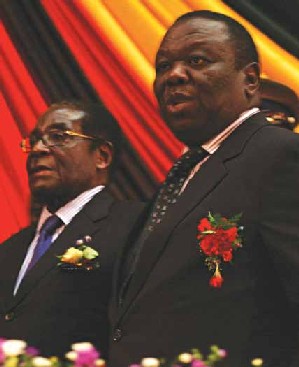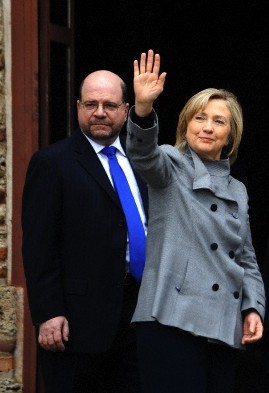|
Zimbabwe Politics | Society US was against Zim unity govt
Among the 243,270 US State Department documents released this night by WikiLeaks, is a larger report from outgoing US Ambassador Christopher Dell, at the time still based in Harare, dated 13 July 2007. Here, "the End" (of the Mugabe regime) is analysed.
MDC leader Morgan Tsvangirai is described as "a brave, committed man and, by and large, a democrat. He is also the only player on the scene right now with real star quality and the ability to rally the masses. But Tsvangarai is also a flawed figure, not readily open to advice, indecisive and with questionable judgment in selecting those around him." Mr Tsvangirai further was described as "the indispensable element for opposition success, but possibly an albatross around their necks once in power. In short, he is a kind of Lech Walesa [Poland's first post-Communism leader] character: Zimbabwe needs him, but should not rely on his executive abilities to lead the country's recovery." Ambassador Dell is even more concerned about other MDC heavyweights. Arthur Mutambara is described as "attracted to radical, anti-western rhetoric." Welshman Ncube had "proven to be a deeply divisive and destructive player in the opposition ranks and the sooner he is pushed off the stage, the better." The US diplomat is worried that, "with few exceptions - Tendayi Biti, Nelson Chamisa - the talent is thin below the top ranks [of the MDC]. The great saving grace of the opposition is likely to be found in the diaspora. Most of Zimbabwe's best professionals, entrepreneurs, businessmen and women, etc., have fled the country," the report sums up. But the worst of all possible leaders in Zimbabwe, according to Ambassador Dell's report, is incumbent President Mugabe. The "Old Man" is described as "more clever and more ruthless than any other politician." "To give the devil his due, he is a brilliant tactician and has long thrived on his ability to abruptly change the rules of the game, radicalise the political dynamic and force everyone else to react to his agenda," the US diplomat explains. But the powers of President Mugabe were described as diminishing, as the Zimbabwean leader had plaid out most of his cards. Mr Mugabe was "fundamentally hampered" by "his ego and belief in his own infallibility; his obsessive focus on the past as a justification for everything in the present and future;" and "his deep ignorance on economic issues," which was "coupled with the belief that his 18 doctorates give him the authority to suspend the laws of economics, including supply and demand." Since the July 2007 report, Ambassador Dell changed office and is now the US Ambassador in Kosovo. President Mugabe is still in power, with Mr Tsvangirai holding the office of Prime Minister. Next year may see an end to the national unity government, as Zimbabwe is preparing for elections. It remains to be seen if 2011 could see the end of the Mugabe regime. By staff writers © afrol News - Create an e-mail alert for Zimbabwe news - Create an e-mail alert for Politics news - Create an e-mail alert for Society news
On the Afrol News front page now
|
front page
| news
| countries
| archive
| currencies
| news alerts login
| about afrol News
| contact
| advertise
| español
©
afrol News.
Reproducing or buying afrol News' articles.
You can contact us at mail@afrol.com









